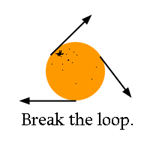

 | Tangentium |
March '04: Menu
All material on this site remains © the original authors: please see our submission guidelines for more information. If no author is shown material is © Drew Whitworth. For any reproduction beyond fair dealing, permission must be sought: e-mail drew@comp.leeds.ac.uk. ISSN number: 1746-4757 |
Snippets"The force and immediacy with which objections to direct democracy surface whenever the subject is mentioned merely demonstrates, if indeed demonstration were needed, that very few political theorists indeed really believe in democracy. Most commentators on public affairs prefer to place their trust in an elite class of professional politicians and policy experts." from R. P. Wolff, In Defense of Anarchism, 1970, pp. xxiii - xxiv. "The liberty of man consists solely in this: that he obeys natural laws because he has himself recognised them as such, and not because they have been imposed upon him by any extrinsic will whatever, divine or human, collective or individual. Suppose a learned academy, composed of the most illustrious representatives of science; suppose this academy charged with legislation for and the organisation of society, and that, inspired by only the purest love of truth, it frames none but laws in absolute harmony with the latest discoveries of science. Well, I maintain, for my part, that such legislation and such organisation would be a monstrosity... human science is always and necessarily imperfect, and that, comparing what it has discovered with what remains to be discovered, we may say that it is still in its cradle... life ever remaining an infinitely greater thing than science." from M. Bakunin, "God and the State", in Selected Writings, 1973. "I bow before the authority of special men because it is imposed on me by my own reason. I am conscious of my inability to grasp, in all its details and positive developments, any very large portion of human knowledge. The greatest intelligence would not be equal to a comprehension of the whole. Thence results, for science as well as industry, the necessity of the division and the association of labour. I receive and I give -- such is human life. Each directs and is directed in his turn. Therefore there is no fixed and constant authority, but a continual exchange of mutual, temporary and above all, voluntary authority and subordination." from M. Bakunin, "God and the State". "...any fool can call themselves anarchist... never read just one pamphlet on any topic." a correspondent to Freedom, 1983. "The best form of government, like the most perfect religion, taken literally is a contradictory idea. The problem is to discover how we can obtain not the best government but the greatest freedom." from P.-J. Proudhon, Confessions of a Revolutionary, 1849, p. 62. "...the arguments that the Internet is an inherently democratic technology or, more cautiously, that it can be used in ways which enhance democracy, are flawed, and amount to little more than a technical fix to an old political problem. It is tempting to believe in the rhetoric, and there are none more willing to repeat it that governments seeking legitimacy and hoping to remain in office. Buoyed up by the discourse of a new information society, the techno-democracy offers a comfortable route to a more peaceful, more equitable future. But to believe in this means accepting that words and ideas alone are sufficient to bring about fundamental change. If that were the case, then certainly the internet (and a few broadcasting technologies) would be all that were needed. But intellectual activity alone does not redress democratic imbalances. The Carnival Against Capitalism, like so many examples before it, showed that when people take to the streets the real sources of power (the state, judiciary and big business in this case) are challenged." from S. Lax, "The Internet and Democracy", in D. Gauntlett (ed.) web.studies, 2000, p. 168. "Alternative uses of technology are sought out by alternative groups. But they are few and far between. They mostly fail because the technology is not aimed at alternative uses, it is not developed to engender real change: for better or worse, it is developed to preserve." R. Sharpe, quoted in F. Webster, Theories of the Information Society, 2002, p. 139. "...one rationalization for the vilification of hacktivism is the need for the power elite to rewrite property law in order to contain the effects of the new information technologies. As a result of the newly evolving intellectual property laws, information and knowledge can now be held as capital. Since new information technology supports easy reproduction of information, the existence of these laws effectively curtails the widest possible spread of this new form of wealth." from M. Manion and A. Goodrum, "Terrorism or Civil Disobedience: Toward a Hacktivist Ethic", in Computers and Society 30/2, 2000. "The center of the free software movement's success, and the greatest achievement of Richard Stallman, is not a piece of computer code. The success of free software, including the overwhelming success of GNU/Linux, results from the ability to harness extraordinary quantities of high-quality effort for projects of immense size and profound complexity. And this ability in turn results from the legal context in which the labor is mobilized. As a visionary designer Richard Stallman created more than Emacs, GDB, or GNU. He created the General Public License." from E. Moglen, "Anarchism Triumphant", First Monday 4/8, 1999. | |